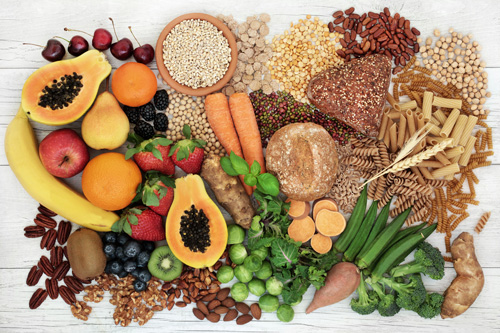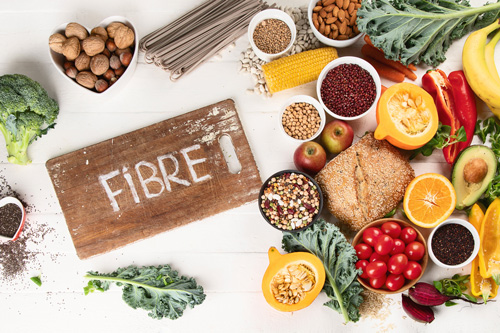Nutrient in Focus: Carbohydrates
Refined carbohydrates
Refined carbs are nutritional imposters, stripped of fibre and nutrients, spiking blood sugar, fuelling cravings, promoting obesity, heart disease, and diabetes—nasty health saboteurs.
Refined carbohydrates are processed foods that have had the bran, fibre, and nutrients removed. This process enhances shelf life and improves texture but strips away beneficial components. Common sources of refined carbohydrates include white bread, pastries, white rice, sugary cereals, and many snack foods.
When consumed, refined carbohydrates are quickly broken down into glucose, leading to rapid spikes in blood sugar levels. This can cause a quick energy boost followed by a crash, leading to feelings of hunger and cravings soon after eating. Over time, frequent consumption of refined carbs can contribute to weight gain, insulin resistance, and an increased risk of type 2 diabetes.
Unlike whole grains, refined carbohydrates lack fibre, essential vitamins, and minerals. Fiber is crucial for digestive health, blood sugar control, and satiety. Without it, refined carbs provide empty calories that offer little nutritional benefit. Additionally, diets high in refined carbohydrates have been linked to heart disease, as they can increase levels of unhealthy LDL cholesterol and triglycerides.
To maintain a healthy diet, it’s recommended to limit refined carbohydrates and choose whole grain alternatives instead. Whole grains, such as brown rice, whole wheat bread, quinoa, and oats, retain their natural fibre and nutrients, providing sustained energy and supporting overall health. Prioritizing whole foods over processed ones is key to achieving a balanced diet and promoting long-term well-being.
Complex Carbs
Complex carbs are nutritional powerhouses, packed with fibre, vitamins, and minerals. They provide steady energy, enhance digestion, support weight management, and promote heart health— wellness champions!
Complex Carbs, also known as whole or non-refined carbohydrates, are unprocessed or minimally processed foods that retain their natural fibre, vitamins, and minerals. These carbohydrates are found in a variety of plant-based foods, including whole grains, fruits, vegetables, legumes, and nuts.
Whole grains, such as brown rice, quinoa, oats, barley, and whole wheat products, are excellent sources of non-refined carbohydrates. These grains include the bran, germ, and endosperm, providing essential nutrients and dietary fibre that aid in digestion, stabilize blood sugar levels, and promote satiety.
Fruits and vegetables are also rich in non-refined carbohydrates. They offer natural sugars, fibre, and a plethora of vitamins and minerals that support overall health. Examples include apples, berries, carrots, sweet potatoes, and leafy greens.
Fact in Focus: Only 6% of Australia’s population eat the recommended amount of fruit and veg- then we wonder why we get sick as we get older? Duh!
Legumes, such as beans, lentils, and chickpeas, are another vital source. They are high in fibre and protein, making them a nutritious choice for maintaining energy levels and supporting muscle health.
Consuming non-refined carbohydrates provides sustained energy, as they are digested and absorbed more slowly than refined carbs. This helps prevent rapid spikes and drops in blood sugar levels, reducing the risk of insulin resistance and type 2 diabetes. Additionally, the fibre in these foods promotes healthy digestion, lowers cholesterol levels, and aids in weight management.
Incorporating a variety of non-refined carbohydrates into your diet ensures you receive essential nutrients and health benefits, supporting long-term well-being and reducing the risk of chronic diseases.
Dietary Fibre
Fibrous carbs are digestive heroes, helping regularity, lowering cholesterol, and balancing blood sugar. They enhance satiety, support gut health, and reduce disease risk—true nutritional essentials.
Dietary fibre is an essential part of a healthy diet and comes in two main types: soluble and insoluble fibre. Both types offer distinct health benefits and are found in various plant-based foods.
Soluble fibre dissolves in water to form a gel-like substance in the digestive system. This type of fibre can help lower blood cholesterol and glucose levels. It slows down the absorption of sugar, making it beneficial for blood sugar control, especially for people with diabetes. Foods high in soluble fibre include oats, barley, beans, lentils, apples, citrus fruits, and carrots. Soluble fibre also promotes a feeling of fullness, which can aid in weight management.
Insoluble fibre does not dissolve in water and adds bulk to the stool, helping food pass more quickly through the stomach and intestines. This type of fibre is crucial for maintaining regular bowel movements and preventing constipation. It also supports a healthy digestive system. Foods rich in insoluble fibre include whole grains, nuts, seeds, and the skins of fruits and vegetables.
In addition to these two primary types, there is also resistant starch, which acts similarly to soluble fibre by resisting digestion in the small intestine and fermenting in the large intestine. Resistant starch is found in unripe bananas, cooked and cooled potatoes, and legumes. It promotes the growth of beneficial gut bacteria, supporting overall gut health.
Fun Fact:
Cooking and cooling some carbs converts them to resistant starch which acts more like fibre. So potato, rice and pasta salads are a much healthier option!
Incorporating a variety of fibre-rich foods in your diet ensures you get the benefits of both soluble and insoluble fibres, promoting overall digestive health, aiding in weight management, and reducing the risk of chronic diseases.

Sue Caloghiris is a qualified and registered Clinical Nutritionist with a passion for evidence – based Nutrition and Lifestyle medicine. She offers workshops for businesses, and health checks for employees looking to tweak a few things to feel better. She also offers comprehensive individual consultations and has a wide range of Practitioner only supplements available when necessary. She is based in Adelaide, but happy to travel anywhere she can be helpful! To find out more or have a chat, visit www.upsidefocus.com.au or call 0416 867 400.
Get in touch
Use the contact form to send us an email.
Better yet, call us on 0417 867 440 and let’s have a chat.
Email: contact@upsidefocus.com.au




